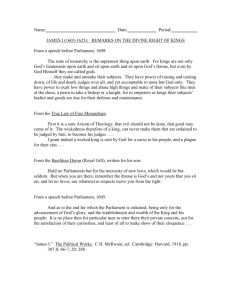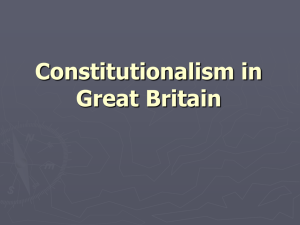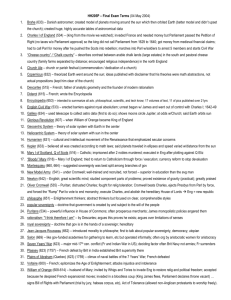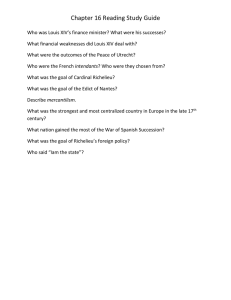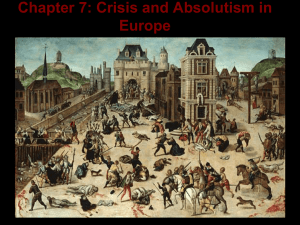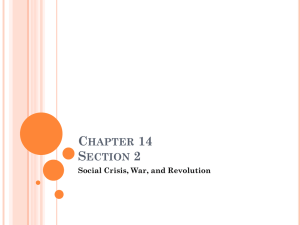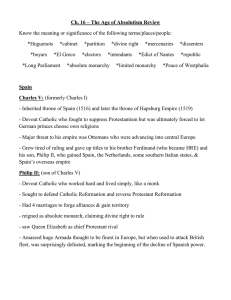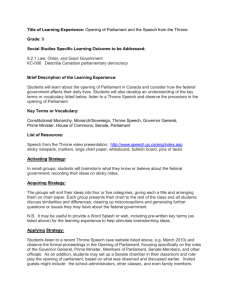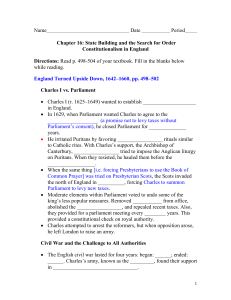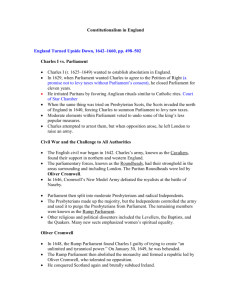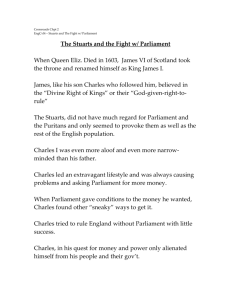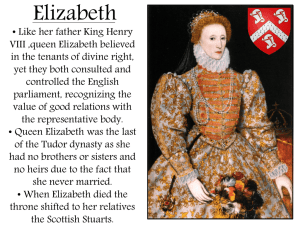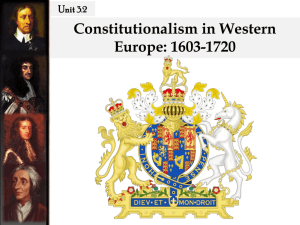Enlightenment - Laroche - English
advertisement
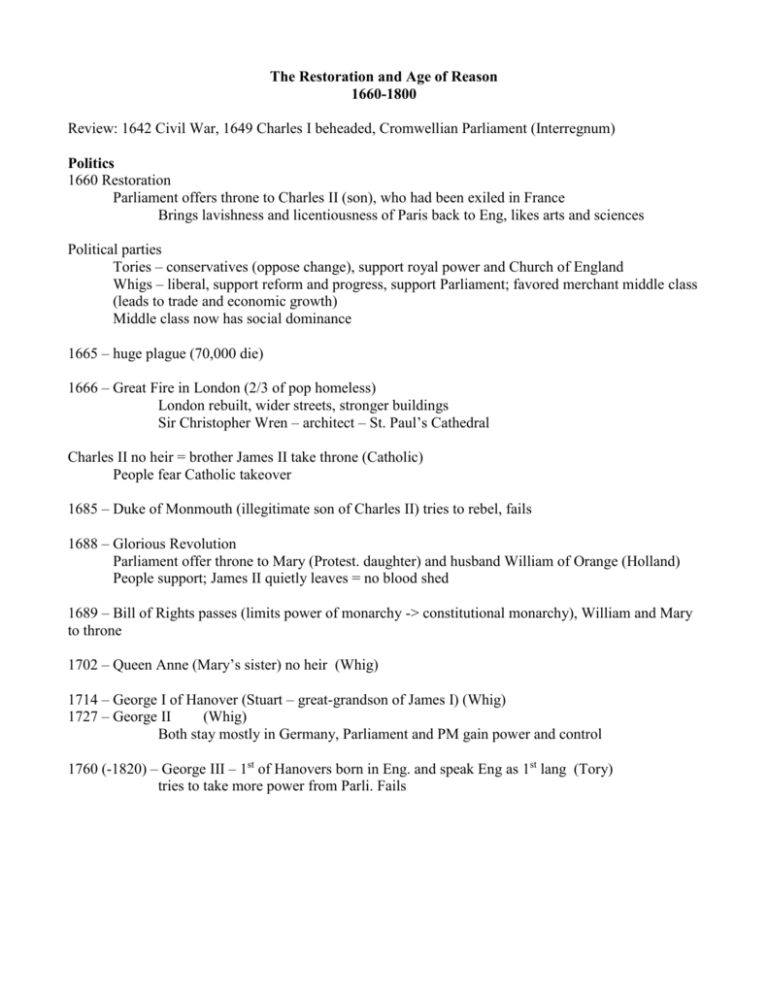
The Restoration and Age of Reason 1660-1800 Review: 1642 Civil War, 1649 Charles I beheaded, Cromwellian Parliament (Interregnum) Politics 1660 Restoration Parliament offers throne to Charles II (son), who had been exiled in France Brings lavishness and licentiousness of Paris back to Eng, likes arts and sciences Political parties Tories – conservatives (oppose change), support royal power and Church of England Whigs – liberal, support reform and progress, support Parliament; favored merchant middle class (leads to trade and economic growth) Middle class now has social dominance 1665 – huge plague (70,000 die) 1666 – Great Fire in London (2/3 of pop homeless) London rebuilt, wider streets, stronger buildings Sir Christopher Wren – architect – St. Paul’s Cathedral Charles II no heir = brother James II take throne (Catholic) People fear Catholic takeover 1685 – Duke of Monmouth (illegitimate son of Charles II) tries to rebel, fails 1688 – Glorious Revolution Parliament offer throne to Mary (Protest. daughter) and husband William of Orange (Holland) People support; James II quietly leaves = no blood shed 1689 – Bill of Rights passes (limits power of monarchy -> constitutional monarchy), William and Mary to throne 1702 – Queen Anne (Mary’s sister) no heir (Whig) 1714 – George I of Hanover (Stuart – great-grandson of James I) (Whig) 1727 – George II (Whig) Both stay mostly in Germany, Parliament and PM gain power and control 1760 (-1820) – George III – 1st of Hanovers born in Eng. and speak Eng as 1st lang (Tory) tries to take more power from Parli. Fails Culture/Philosophy Enlightenment – through reason and observation of nature, man could discover the order underlying all things Rationalism – reason, rather than sensory experience or faith, can answer the basic questions of human existence (Engl version includes more experience than rest of Europe) Ideas lead to huge scientific progress (ie Newton and gravity, scientific method) Agricultural revolution (1600s) New tools, fewer farmers needed, more food, higher popul., people move from country to city Industrial revolution (1750 ->) Steam engine, power looms, factories, merchants (=money for country) Working class grows, but still few rights Social decline – pollution, smoke, bad working conditions and hrs, city crowding, poverty Huge inequality in distribution of wealth, esp in London Eventually ppl lose faith in science and reason to solve problems Relative freedom from prejudice and suspicion in religion and politics; except w/ women Ppl concerned with manners and morals (reaction to Charles II and French licentiousness) – moralists Concerned with understanding the self, immediate world, and relationship with others (using reason) John Locke’s Essay Concerning Human Understanding Americans also use rationalism/Enlightenment (Common Sense and Decl of Indep) Literary Culture Middle class influence – more $ -> more time to read and more books bought; want to read about ppl like them = realistic novels Coffeehouses – mid class men gather to discuss intellectual ideas, esp writers and thinkers Literary periodicals and periodical essays (esp Addison and Steele – The Spectator, The Tattler) Theatre – v. popular Comedies of manners (intrigue, infidelity, social class issues) Elaborate, fancy, etc. Women can now act (but immoral) Neoclassical – imitation of Greek and Roman classics, allusions to them - harmony, restraint, clarity (not ornate) - view of the populace, not individual - Incl. Ben Jonson (poet, playwright, critic), v. influ. Metaphysical poetry – v. intellectual lyrics - structured like arguments, - incl science, law, philosophy - incl John Donne Occasional poetry – poem written for a particular important occasion Satire – pokes fun at society’s follies in a serious tone to promote improvement - Jonathan Swift is master (critiques mid class) - believes human nature deeply flawed, need to recognize limits to get proress Puritans John Milton – mid class, educated in classics, Calvinist - 1640s supported Parliament and Cromwell in “pamphlet wars” - 1652 goes blind from work, THEN composes epic Paradise Lost (dictated to daughter) John Bunyan – supported Parliament, traveling preacher - jailed after Charless II to throne, where wrote A Pilgrim’s Progress (v. popular) Prose fiction – invention of novel (for mid class), infl. by travel writing (Defoe’s Robinson Crusoe) John Dryden – poet laureate - plays, satiric poems, occasional poems, essays (1st modern prose) Alexander Pope – neoclassical (wit, elegance, moderation) poet and critic - Rape of the Lock Aphra Behn – wrote plays for money b/c husband in debtors’ prison - 1st professional female writer - wrote early novels (Oroonoko) Samuel Johnson – 1755 The Dictionary of the English Language standardizes lang By 1800 people begin to lose faith in the idea that human reason can solve society’s problems, which leads to a new way of writing and thinking.

